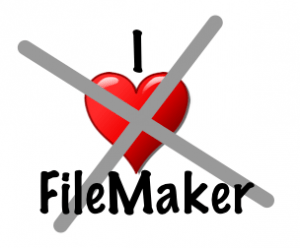“I hate FileMaker!” Several years ago, these were the words I heard from a veteran  developer. This is a true tale of corporate waste.
developer. This is a true tale of corporate waste.
We had implemented a great Claris FileMaker project management solution that had been in use for years to track all the critical information associated with thousands of jobs in a large corporate IT environment.
An IT executive decided to replace this FileMaker solution with something that he considered an “enterprise solution” backed by Microsoft SQL Server. (Sometimes this might be necessary, but in this case it was not.) Call me cynical, but many times major decisions are made on the golf course by buddies that want to help each other and do not have the technical knowledge required to make good decisions.
A new company was brought in with their project management solution and a team of developers that were tasked with customization, importing of data from the existing system, and implementation of the product including training, etc. I was working directly with the new developers to assist with reproducing similar functionality as the original solution as well as to import the existing data. During one meeting a developer threw up his hands and said
“I hate FileMaker!”
“Why?” I asked.
“Because it does things we just can’t do.” was his answer.
He was finding it very difficult to replicate functionality that is inherent to how FileMaker works as a client…functionality that puts power in the hands of users to find and work with data in ways that can take hundreds of hours to replicate in a pure web-based solution.
The new application was eventually installed and put to use. Unfortunately, it was rejected by users as difficult to use and less helpful than the original FileMaker solution. Then to top off the project failure, the company that made the replacement application was bought out by another vendor and they killed the app. In the interim of deciding what new direction was necessary, the FileMaker solution was reinstated.
Over $2.5 million dollars was thrown at this problem with the final result being an incredible waste and loss of productivity…all because Claris FileMaker was not considered to be an “enterprise solution”. The lack of understanding of what FileMaker was and what problems it is good at solving caused this issue.
The other instance where people say “I hate FileMaker!” is when a user has a poorly designed and built FileMaker solution…or one that has just aged and is not using the modern FileMaker platform that has changed significantly over the years. FileMaker’s face to them is really only one particular solution and not the application platform itself that can be made to do anything.
Many FileMaker systems were built by amateur developers that were able to solve many problems with the tool but lacked the technical experience and knowledge of how to take the solution to the next level through the use of mobile systems or integration with other applications and web sites. FileMaker can do all those things. It takes a talented developer that knows how to create brilliant solutions. We often say “If you knew FileMaker many years ago, forget everything you know and start fresh.” Today, it’s a powerful platform that can do so many things on macOS, Windows, iOS, Android, and web…and it’s owned by the largest tech company in the world…Apple.
FileMaker solves many problems effectively and with elegance. Since FileMaker is a platform used to build totally customized software, the quality of the solution depends on the quality of the developers that build it. Knowing when to deploy FileMaker to solve a problem and take advantage of its capabilities is the key to winning. When it does fit, you’ll hear the end users and IT management say in unison “We LOVE FileMaker!”


